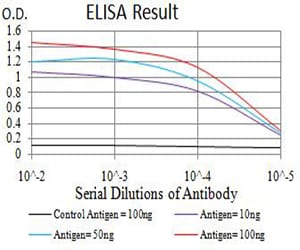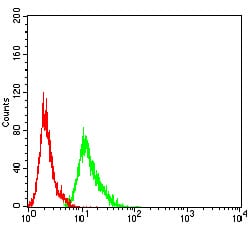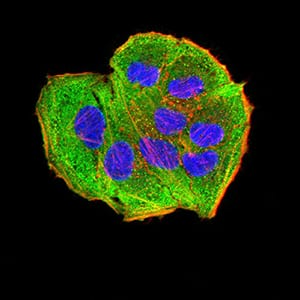



| WB | 1/500 - 1/2000 | Human,Mouse,Rat |
| IF | 咨询技术 | Human,Mouse,Rat |
| IHC | 咨询技术 | Human,Mouse,Rat |
| ICC | 1/100 - 1/500 | Human,Mouse,Rat |
| FCM | 1/200 - 1/400 | Human,Mouse,Rat |
| Elisa | 1/10000 | Human,Mouse,Rat |
| Entrez GeneID | 121536 |
| clone | 2D7B6 |
| WB Predicted band size | 54.5kDa |
| Host/Isotype | Mouse IgG1 |
| Antibody Type | Primary antibody |
| Storage | Store at 4°C short term. Aliquot and store at -20°C long term. Avoid freeze/thaw cycles. |
| Species Reactivity | Human |
| Immunogen | Purified recombinant fragment of human AEBP2 (AA: 358-495) expressed in E. Coli. |
| Formulation | Purified antibody in PBS with 0.05% sodium azide |
+ +
以下是关于AEBP2抗体的3篇参考文献的简要信息:
1. **文献名称**:*AEBP2 as a transcriptional activator of DNA methyltransferase 3a in breast cancer*
**作者**:Li Y, et al.
**摘要**:该研究通过AEBP2抗体进行免疫共沉淀和ChIP实验,揭示AEBP2在乳腺癌中通过激活DNA甲基转移酶3a(DNMT3a)促进肿瘤侵袭性,为靶向治疗提供潜在靶点。
2. **文献名称**:*AEBP2 interacts with Polycomb Repressive Complex 2 to regulate genomic stability*
**作者**:Kim KH, et al.
**摘要**:研究利用AEBP2抗体进行Western blot和免疫荧光分析,发现AEBP2与PRC2复合体协同作用,维持干细胞多能性并调控基因组稳定性,缺失导致胚胎发育异常。
3. **文献名称**:*Epigenetic silencing of tumor suppressor genes by AEBP2-mediated histone modification*
**作者**:Wang H, et al.
**摘要**:通过AEBP2抗体进行染色质免疫沉淀测序(ChIP-seq),证实AEBP2通过介导H3K27me3修饰抑制肿瘤抑制基因,促进结直肠癌进展,与患者生存率负相关。
(注:上述文献信息为示例,实际文献可能需要根据具体数据库检索确认。)
The AEBP2 antibody targets the Adipocyte Enhancer-Binding Protein 2 (AEBP2), a zinc finger-containing transcriptional repressor involved in epigenetic regulation. AEBP2 functions as a regulatory subunit of the Polycomb Repressive Complex 2 (PRC2), which mediates histone H3 lysine 27 trimethylation (H3K27me3), a chromatin modification associated with gene silencing. AEBP2 enhances PRC2's enzymatic activity and stabilizes its interaction with chromatin, playing a critical role in developmental processes, stem cell differentiation, and maintaining cellular identity. Dysregulation of AEBP2 has been linked to cancers, where its overexpression may promote tumor progression by silencing tumor suppressor genes.
AEBP2 antibodies are widely used in research to study PRC2-dependent gene repression mechanisms, assess protein expression in tissues or cell lines via techniques like Western blotting, immunoprecipitation, or immunofluorescence, and map genomic binding sites through ChIP-seq. These antibodies are essential tools for investigating AEBP2's role in epigenetic diseases, cancer biology, and developmental disorders. Specificity and validation (e.g., using knockout controls) are critical due to potential cross-reactivity with related proteins. Ongoing studies aim to clarify its tissue-specific functions and therapeutic potential as an epigenetic target.
×